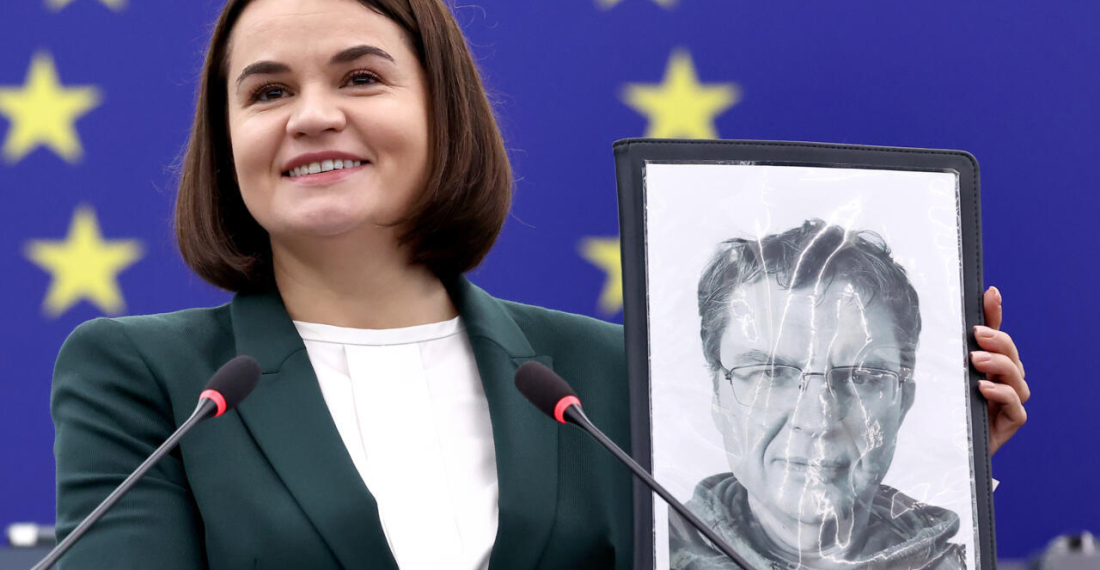The European Parliament has awarded the Sakharov human rights prize to jailed Georgian journalist and editor Mzia Amaghlobeli and Polish-Belarusian journalist Andrzej Poczobut, calling them symbols of the "struggle for freedom". Amaghlobeli, 50, has emerged as a symbol of journalistic defiance to what the European Union says is a slide toward authoritarianism in her country.
Poczobut, 52, was jailed over his critical reporting, having refused to leave Belarus after its authoritarian government unleashed a crackdown on dissent, jailing hundreds and forcing most critics into exile. "Both are journalists currently in prison on trumped-up charges simply for doing their work and for speaking out against injustice," European Parliament chief Roberta Metsola said in announcing the laureates in Strasbourg. "Their courage has made them symbols of the struggle for freedom and democracy. This House stands with them and with all those who continue to demand freedom."
The Sakharov Prize, set up in 1988 and named after Soviet dissident Andrei Sakharov, is bestowed annually on individuals or organisations to recognise their fight for human rights or democracy. Contenders are nominated by parliament's political groups as well as individual lawmakers.
The choice of this year's winners "sends a strong message to all political prisoners that you are not alone, and journalism is not a crime," exiled Belarusian opposition leader Svetlana Tikhanovskaya told lawmakers. She was in Strasbourg with her recently released husband.
The candidacy of Poczobut and Amaghlobeli was backed by parliament's biggest group, the conservative EPP, and the hard-right ECR.
Amaghlobeli has championed investigations into public spending and abuse of office through her independent newsrooms Batumelebi and Netgazeti.
The recognition of her "sacrifice and courage celebrates the fight for democracy of the entire Georgian people," the outlets said in a statement to AFP, calling the award "historic".
Amaghlobeli was arrested in January after TV footage showed her grabbing a police officer and slapping him amid a heated exchange during a protest in the Black Sea city of Batumi. Despite appeals from Georgian and international rights groups to release her, a court in August sentenced her to two years in prison on charges of using "resistance, threat or violence" against an official. "Whatever decision you make, I want you to know that I consider myself victorious," she told the court ahead of the verdict. "What happened was not an attack," she said, calling it a "symbolic slap."
Georgian authorities, which critics accuse of moving the ex-Soviet state back towards Russia, have launched a targeted crackdown on opposition leaders and dozens of anti-government protesters amid a year-long political stand-off.
Detained since 2021, Poczobut, a correspondent for Polish newspaper Gazeta Wyborcza, was sentenced to eight years in jail in February 2023, in a verdict Poland slammed as "unfair". He had covered mass protests against Belarusian President Alexander Lukashenko in 2020.
His jailing came at a time of heightened tensions with Poland, which has become a hub for thousands of Belarusians fleeing their homeland, ruled by Lukashenko since 1994. "He's on my mind every day," Polish Foreign Minister Radoslaw Sikorski said last year after Warsaw failed to secure the release of Poczobut in a major swap deal between Belarus's main ally, Russia, and the West.
Gazeta Wyborcza's deputy editor-in-chief Roman Imielski said he hoped the award would "mark a new opening" for Poczobut to regain his freedom. Concerns have been raised for his health in the country's notoriously secretive prison system, where inmates are regularly held incommunicado for months.
The prize comes with a 50,000-euro ($58,000) endowment and will be handed out in a ceremony on December 16.
Venezuelan opposition leader Maria Corina Machado and her ally, former presidential candidate Edmundo Gonzalez Urrutia, were last year's winners. Machado went on to win this year's Nobel Peace Prize.







